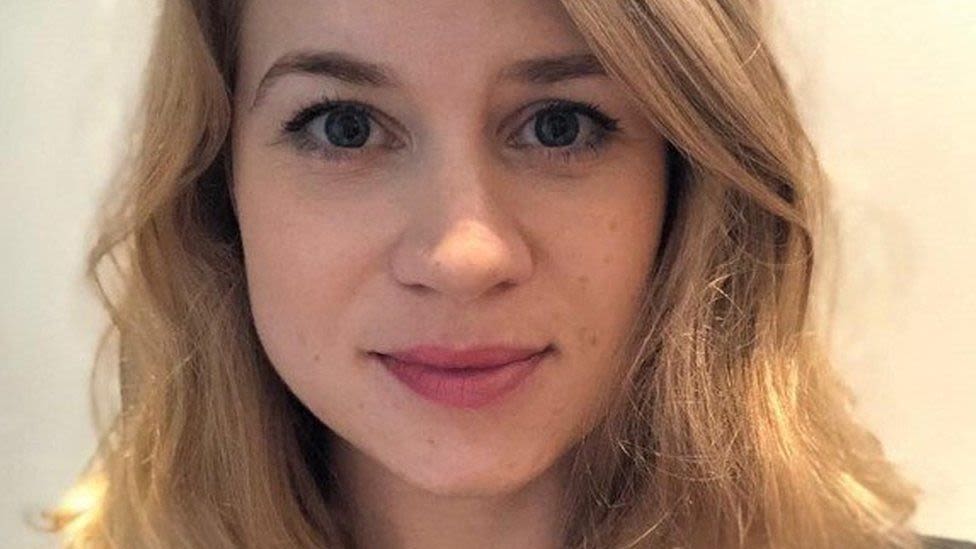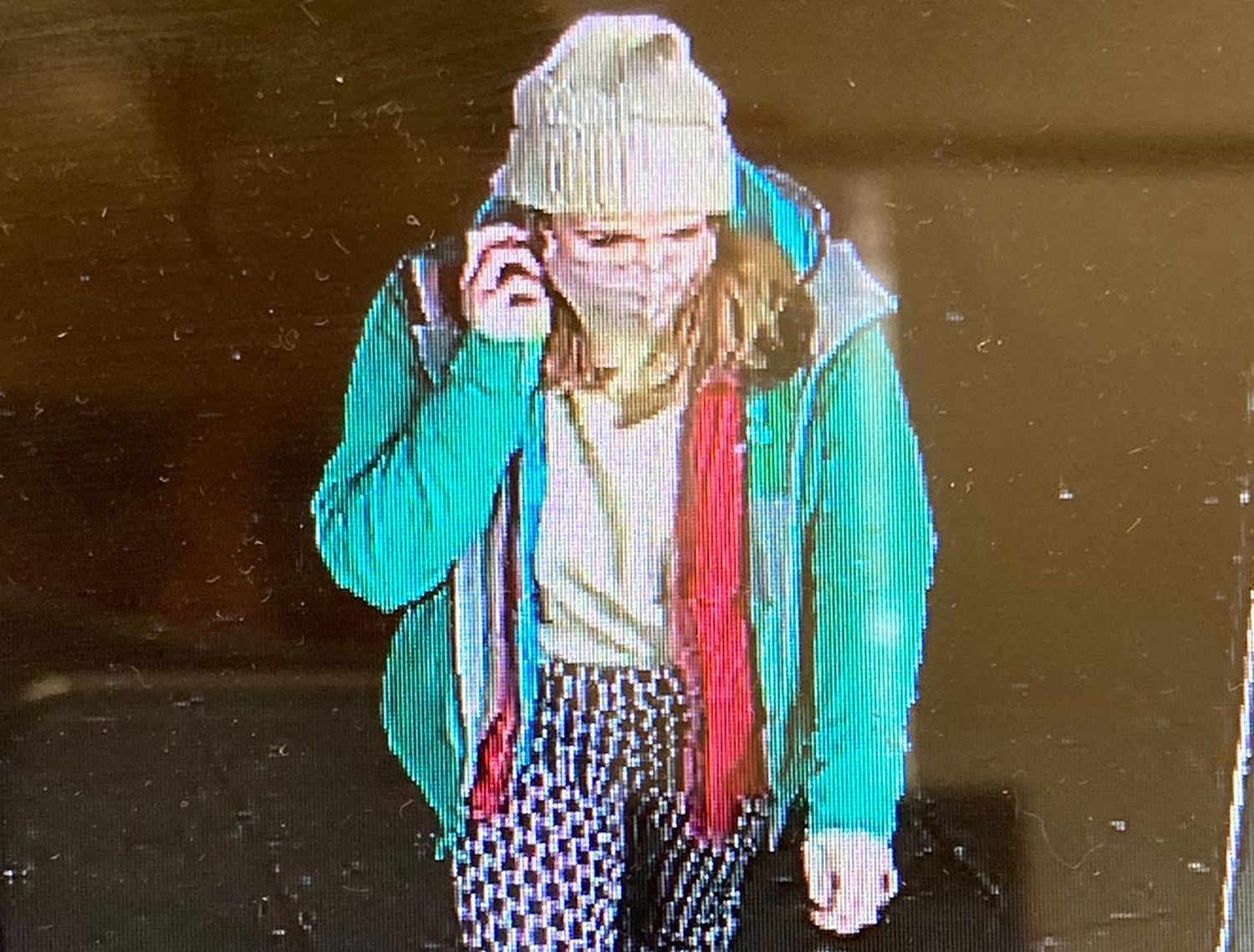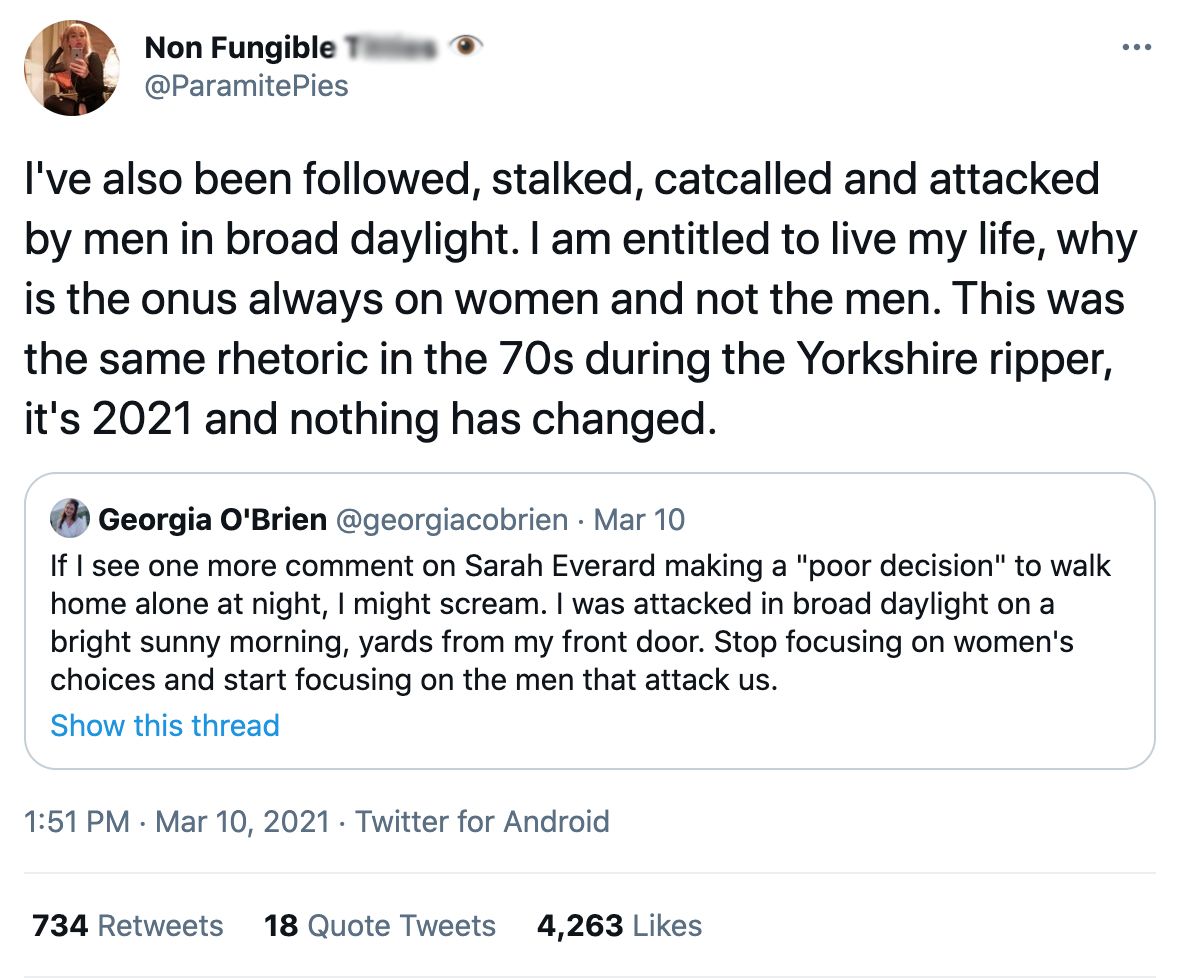'Reclaim the Night': Women campaign for safer streets after the death of Sarah Everard in London

Social media platforms have been flooded with the stories of women sharing their experiences of feeling unsafe in public after the disappearance and now confirmed death of Sarah Everard. Metropolitan police officer Wayne Couzens has been arrested and charged with kidnapping and murdering her.
Sarah Everard, a 33-year-old marketing executive, vanished on her way back home from visiting a friend in Clapham, south London, at about 9 p.m. on March 3.
Since then, her case has dominated the headlines in the UK. Vigils planned to take place in Clapham and cities across the UK on the evening of March 13 were cancelled because of COVID-19 restrictions. Instead a doorstep vigil was scheduled for 21.30 GMT, with people urged to hold a candle or shine a light in her memory.
READ MORE
Doctor recalls Italy's first COVID-19 case
China's Two Sessions at a glance
How did 'nudge theory' do during COVID-19?
The advice from the London Metropolitan Police in the days following Everard's disappearance – asking women in Clapham not to go out alone – sparked an outpouring of frustrated posts on social media, with women feeling the burden of responsibility being pushed on to the victims rather than efforts being made to make women feel safer.
Women in my area have been advised " not to go out alone" while Sarah Everard's disappearance is investigated.
— Georgia Ladbury WEP 💚💜 (@GeorgiaLadbury) March 9, 2021
How about we urge men not to go out instead? Say a curfew at nightfall?
Perhaps we'd see more done about street safety if it were men losing their freedoms, not women.
"I know Londoners will want to know that it is thankfully incredibly rare for a woman to be abducted from our streets," said Cressida Dick, the Police Commissioner for London.
"But I completely understand that despite this, women in London and the wider public – particularly those in the area where Sarah went missing – will be worried and may well be feeling scared."
And Dick is right – women are scared. But what she failed to acknowledge is that the fear women feel when walking in the streets of the UK capital was already there before Sarah Everard's abduction.
It was there because 188 women were killed in the UK last year, in the majority of the cases by a partner or ex-partner.
It was there because 1.6 million women in the UK reported being victims of domestic abuse in the last year.
And it's a fear that knows no boundaries: globally, one in three women has experienced physical or sexual violence.
It's an internalized fear that women are used to living with and that influences women's behavior every day of their lives, as they bet their safety on the little measures they've been told might protect them from danger: clutching their house keys as they go home, preferring well-lit, crowded streets to dark alleys with nobody in sight, calling a friend or a relative while walking alone.
A recent survey produced by UN Women UK and reported by The Guardian shows that 80 percent of women in the country had been sexually harassed in public spaces, while this number peaked to 97 percent for women aged between 18 and 24.
"We could all be Sarah"
On March 3, Everard took the better-lit, longer way back to get home. CCTV footage shows she was on her phone. She called her partner for 15 minutes, stuck to the busy streets, wore bright, colorful clothes and running shoes.
Women adapt their behavior on a daily basis to avoid male violence. "Was casually looking at new rape alarms last week as though it were no more abnormal than buying socks," tweeted Nicola Keaney while commenting on the Everard case.
Was casually looking at new rape alarms last week as though it were no more abnormal than buying socks. So normal that women reading this will just nod in unison. That is daily life. Imagine then being told the solution is 'don't drink too much'... How about control yourself.
— Nicola Keaney (@NicKeaney) March 10, 2021
Many women on social media pointed out that Everard had possibly done everything she could to be safe, everything she was most probably told to do since she was a child that would keep her out of danger.
Keys between fingers, walking in the middle of the road, avoiding gaps in hedges or entrances to alleyways, phone on, headphones out, cross the road, check over your shoulder. We aren't born doing this stuff, we learn over years of watching women's trauma play out #SarahEverard
— Sophie Gallagher (@SCFGallagher) March 10, 2021
This is what sparked the outrage of the women sharing their experiences of feeling unsafe in public, whether at night or in broad daylight, on social media: the fact that despite all of the acts of personal protection one can make, a woman in 2021 can't take her safety for granted when walking alone on the street.

METROPOLITAN POLICE/AFP
METROPOLITAN POLICE/AFP
UK Home Secretary Priti Patel said that the anxieties and anger shared by women on social media "are so powerful because each and every woman can relate," adding that every woman should feel safe to walk on the streets "without fear of harassment or violence."
What women in the UK are asking is that they shouldn't be the ones asked to change their behavior to protect themselves, but that the structural problem in our society – toxic masculinity, male violence, misogyny – is properly addressed.
#ReclaimTheseStreets Every woman should be able to walk home safely without fear. Stop telling women to change their behaviour. It is this awful misogyny that needs to be abolished. We need structural, legal, progressive change to protect women & girls, not empty words. pic.twitter.com/B8pjXVKAdg
— Elif Shafak (@Elif_Safak) March 10, 2021
"Every single woman I know is overwhelmed by the Sarah Everard story," tweeted journalist and author Rebecca Reid. "It's the thing they teach us to be afraid of from childhood. It's proof that we're not afraid for no reason."
"Being a woman: my 'outside' day finishes at sundown," tweeted author Caitlin Moran. "If I haven't taken the dog for a walk/jogged by then, I can't. In the winter, it often means the choice between exercise and work. Today, I had to stop work at 4 to exercise. My husband worked until 6, and is now off for a run."
Thousands of women shared their episodes of daily terrors when walking alone and the harassment they suffered while coming home from work, after an evening with friends and on all sorts of occasions.
"Like so many women on here, I'm thinking about Sarah Everard, her family and friends," tweeted journalist Rosamund Urwin. "That could have been any of us. There's so much emphasis on teaching girls how 'to be safe' as though that will protect us, when really we need a different conversation: how to end male violence."
In a social environment where victims are often blamed for what happens to them and the conversation on changing the toxic culture objectifying and victimizing women is regularly dodged (at the same time as the #saraheverard hashtag was trending on Twitter, so was #notallmen), many men on Twitter have expressed their shock at discovering how many women fear for their safety on a daily basis.
"I've been going jogging pretty much every night at 11ish, as that's when the streets are quietest," tweeted James Wong. "I always find the dark, empty city kind of relaxing. It hasn't ever even occurred to me how privileged I am to be able to think that."
Walk your friends home no matter how safe you may perceive the route, cross road if you’re walking behind a lone female and discuss with your male friends, I still don’t think men have any comprehension of how scary it can be walking alone at night as a female.
— Sara Lee 💙 (@SaraLee) March 10, 2021
Call out any friends you may have who catcall or make women feel uncomfortable. You might be lucky enough not to have any friends like this, but if you do then using your voice to defend us and help educate as to how their actions make us feel is invaluable
— Carrianne Morris (@CazQueenOfHeart) March 10, 2021
When Stuart Edwards tweeted "I live less than five minutes from where Sarah Everard went missing. Everyone is on high alert. Aside from giving as much space as possible on quieter streets and keeping face visible, is there anything else men can reasonably do to reduce the anxiety/spook factor?" thousands of women welcomed the opportunity to tell men what they can do to help them feel safer.
"Cross the street to avoid walking behind a woman," answered Fiona Sturges. "Give all women space. Never run close to them when jogging, esp[ecially] in the dark – I'm endlessly astonished at how many men do this. Offer to walk female friends home."
And if as a man you can't cross to the other side of the road, "get your phone out and make a call," suggested Charley. "Hearing you chatting to a friend would make the woman feel much less anxious. Take off your hat & hands out of your pockets and swing them a bit. She'll be checking behind her to see what you're doing with your hands."
An anti-victim-blaming march for Everard and "all women threatened on our streets," retitled "Reclaim These Streets," was initially organized for Saturday in Clapham, where Everard disappeared.
Hundreds of people were expected to attend, but the organizers were forced to call off the vigil after the local police didn't legally clear the initiative and said that each woman organizing the march could risk a $14,000 (£10,000) fine for breaching lockdown rules.
The vigil is now expected to be held virtually.
The initiative echoes the events that took place in Leeds in 1977 after the 'Yorkshire Ripper' murders, when after the police told women not to leave the house alone after sunset, women marched carrying signs saying "No Curfew on Women – Curfew on Men."

Almost 50 years later, fear is still a normal feeling for women. Something as simple as safely walking the streets of their own city at night alone is still a right that women have to march for.